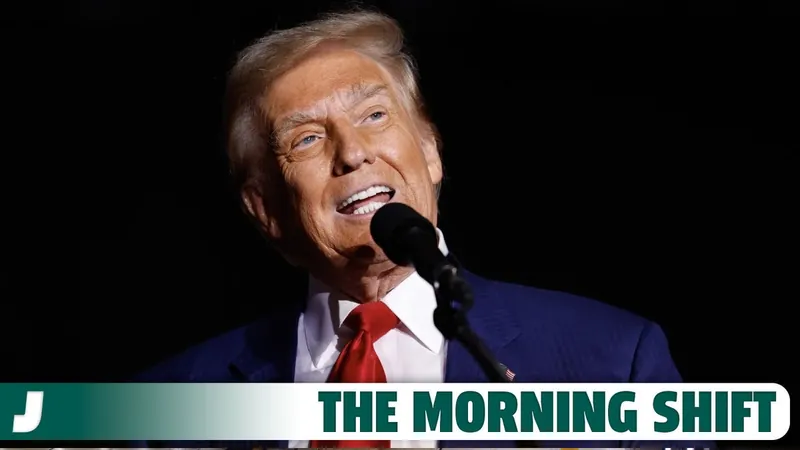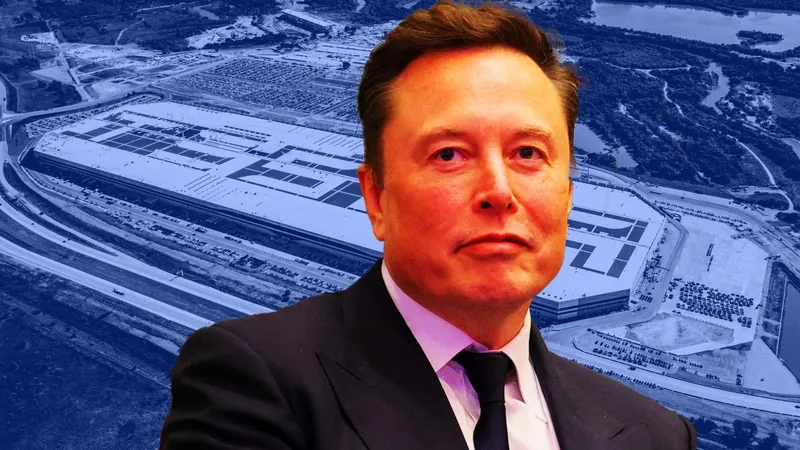
American Automakers Unite Against Trump’s EV Cuts: What You Need to Know!
2024-11-22
Author: Lok
In a bold move that could shape the future of electric vehicles (EVs) in America, major automakers are stepping up their opposition against the impending cuts to EV support proposed by former President Donald Trump. As President Biden's administration aims to push the U.S. further into a green future, Trump’s rollback of EV incentives has sent shockwaves through the automotive industry.
A Shift in Priorities: Automakers Fight Back
While Trump has softened his rhetoric towards EVs since his financial outreach from Tesla's Elon Musk, his administration still aims to slash tax credits and reduce investments in electric vehicle technology. Automakers across the United States, from General Motors to Toyota and Volkswagen, have heavily invested millions into the EV market, revamping factories and launching new electric models. They fear the consequences of abandoning tax breaks and tightening emission regulations could render these investments futile.
The urgency of this situation is underscored by a letter sent to Trump on November 12 by the Alliance for Automotive Innovation, which represents many major auto manufacturers. The letter expressed concerns about the proposed changes, emphasizing the need for “reasonable and achievable” emissions regulations that are in tune with the current auto market realities.
Additionally, the automakers raised alarms about competing against heavily subsidized electric vehicles from China. The Chinese government has implemented a comprehensive regulatory framework supporting not only the sales of EVs but also the development of self-driving technologies, putting American manufacturers at a competitive disadvantage.
The $7,500 tax credit at risk of being cut is crucial for stimulating the adoption of EVs in the U.S. Without such incentives, manufacturers may fall significantly short of the goal set by the current administration, which calls for 35% of new car sales to be electric by 2032.
Strike Threats and Production Challenges at VW
Meanwhile, Volkswagen is experiencing its own struggles. The company faces urgent calls from the IG Metall union to prepare for potential strikes starting December 1, citing stalled negotiations over worker wages and job security amid rumors of factory closures. The union represents thousands of Volkswagen workers in Germany, where the automaker is under pressure to make aggressive cost cuts to stay competitive.
Discussing the consequences of these negotiations, the union has recommended strike action, emphasizing their rights in the ongoing discussions over wages for 120,000 employees at six German plants. As the company grapples with the potential closure of several facilities, including those producing popular electric models, the health of Volkswagen’s workforce hangs in the balance.
Ford’s Production Conundrum
Adding to the tumult, Ford is also feeling the squeeze. As sales of its iconic Bronco SUV have dipped by 10% this year, Ford has announced plans to reassign approximately 400 workers from its Michigan Assembly Plant, which has led to a reassessment of output. This decision aligns with Ford’s broader strategy to adjust production based on fluctuating demand and inventory levels.
Despite these challenges, Ford is optimistic about a rebound in Bronco sales as they head into the end of the year. The need for inventory balance is critical as the company also faces struggles in Europe, dealing with lesser-than-anticipated demand for new electric vehicle models.
Mercedes-Benz Joins the Cost-Cutting Parade
As the automotive industry braces itself for economic turbulence, Mercedes-Benz is planning to cut costs significantly in the coming years. With ambitions of trimming several billion euros from its financials annually, the German automaker’s strategy aims to enhance its competitive stance in a rapidly shifting market. However, this cost-cutting does not predict massive job losses, thanks to a protective policy in place until 2029.
Conclusion: What Lies Ahead for American Automakers?
The collective moves from major U.S. automakers against proposed EV cuts signify a watershed moment for the industry, showcasing the importance of sustained support for electric vehicles amid global competition and regulatory changes. As manufacturers brace for potential strikes, production cuts, and ongoing negotiations, all eyes are on the evolving landscape of electric mobility. Will they successfully influence policy to safeguard their investments, or will Trump’s cuts leave the industry in a precarious position? Only time will tell, but one thing is certain: electrification remains at the forefront of automotive innovation and competition.





 Brasil (PT)
Brasil (PT)
 Canada (EN)
Canada (EN)
 Chile (ES)
Chile (ES)
 España (ES)
España (ES)
 France (FR)
France (FR)
 Hong Kong (EN)
Hong Kong (EN)
 Italia (IT)
Italia (IT)
 日本 (JA)
日本 (JA)
 Magyarország (HU)
Magyarország (HU)
 Norge (NO)
Norge (NO)
 Polska (PL)
Polska (PL)
 Schweiz (DE)
Schweiz (DE)
 Singapore (EN)
Singapore (EN)
 Sverige (SV)
Sverige (SV)
 Suomi (FI)
Suomi (FI)
 Türkiye (TR)
Türkiye (TR)